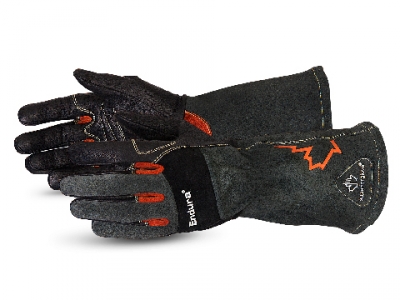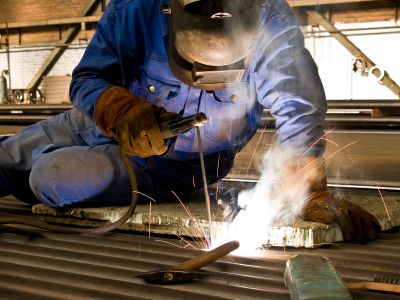Contents
Introduction
Welding is a tough but necessary business, one that requires the proper knowledge and the right equipment. Whether you’re a master, journeyman, apprentice, or novice, you’ll want to make sure you’re properly protected against the hazards of the trade by investing in the right products. One of the most important is gloves designed specifically to hold up against mechanical hazards, heat, electricity, and water since welding occurs in all sorts of locations. But how do you choose the right gloves? Well, there are a few specifications you need to keep in mind when choosing the right gloves for you.
Welding Glove Requirements
Welders face tough conditions, especially when compared to many other jobs. It’s important to identify just what each individual job might require based on where the welding needs to be done, the objects worked on, and the general environment. Overall, welding gloves need to be made of a sturdy material, heat resistant, water resistant or waterproof and be able to resist electrical shocks.
The gloves also need to fit correctly. While some manufacturers do make welding gloves that don’t cover the entire hand, these are not recommended. You want a pair that fully covers the fingers, palm, back of the hand, and the wrist. This means you are better protected from the numerous hazards lurking on the worksite.
Potential Hazards on the Job
There are numerous hazards on the typical welding worksite, and all of them can damage the hands and body of the professional if they don’t talk about the proper precautions. One of the most common issues faced by workers is the ever-dangerous mechanical hazards. These are caused by the machines a welder needs to work with and can range from a hand or finger being pinched between gears and shifts, accidentally dropping tools, or being cut by the metal being welded. The most common injuries are cuts, scrapes, tears, and punctures on the hands. The right glove material can prevent injuries, so it’s important to research and shop around.
The second most common hazards are thermal. These are injuries caused by rapid changes in temperature, usually heat. Welding requires professionals to be able to expertly control their torches to melt metal together into the perfect. Unfortunately, there is always room for error. Many welders end up getting burns from molten metal dripping onto their hands, the heat coming off of tools, slag, arc rays, hot instruments, splatter, and even sparks. The best way to avoid damage is to have a helmet and the right gloves for the job.
The final common hazard type is electrical. These come from working around electrical equipment, especially in wet conditions. Welders are liable to be shocked and zapped from insulation failure or exposed wires. In fatal cases, they can be electrocuted. This is why it’s important to choose the right material when picking a pair of gloves for work.
Available Materials
Manufacturers make welding gloves in a variety of materials. Some of the most frequently seen are cowhide, pigskin, aluminized leather or synthetics, rubber, treated cotton, and deerskin. Each material comes with separate advantages and disadvantages, especially related to flexibility and durability. Rubber gloves, for example, are great in wet environments or wear electrical hazards are likely, but aren’t flexible and tend to be made of thin material. Treated cotton, on the other hand, is comfortable and flexible and great at absorbing liquids. It is not, however, good with heat or handling dangerous materials like molten metal.
Gloves made from animal skin were popular for decades because they are naturally resistant to moisture, durable, and flame and heat resistant. They do well when dry but can wear down over time and become a hazard when working with electricity and too much heat. Pigskin is definitely the most flexible of the skins, but cowhide has been popular for gloves for centuries.
Finally, there is aluminized material. These gloves are perfect for individuals who know they have to work around a lot of heat simply because the material has been treated to work in fluctuating temperatures and other difficult conditions. Not only is the fabric heat-resistant, but it can also bounce head radiation away from the hands, keeping fingers and palms safe from burns.
Choosing the correct material will largely depend on where and how you plan on working. Don’t be afraid to try on a few pairs to find what fits and feels right for you.
Know Your Welding
Finally, when picking a glove, know the type of welding you need to do. Gloves that work for Gas
Tungsten Arc Welding would need to be thin and flexible because of the scale of the project. However, if you need to engage in Air Carbon Arc Cutting, you will want something tough and durable for maximum protection. If you’re a professional, you know what type of welding you will need to do on a regular basis. If you are more of a home welder, then look at your instruments and determine what your specific needs are before making any purchases.
Conclusion
The ideal pair of welding gloves need to meet a few key specifications. They should be free of holes and tears and the material needs to be durable enough to withstand hazards but flexible enough to allow welders to be nimble. They should be heat resistant, water resistant, and insulated. The ideal welding gloves will also fit properly around the palms and fingers since no individual willingly puts on clothing that is uncomfortable or unpleasant to wear. Once these specifications are met, you’ll have the perfect pair of gloves for any welding project, professional or amateur.
What’s Next
Now that you know what to look for when choosing the best welding gloves online, you can move on to your projects. If you would like more guides like this one, or other tips, tricks, and product reviews for welding equipment, visit our homepage. We post content regularly to our website to keep you up to date and informed about all of your welding needs.

















